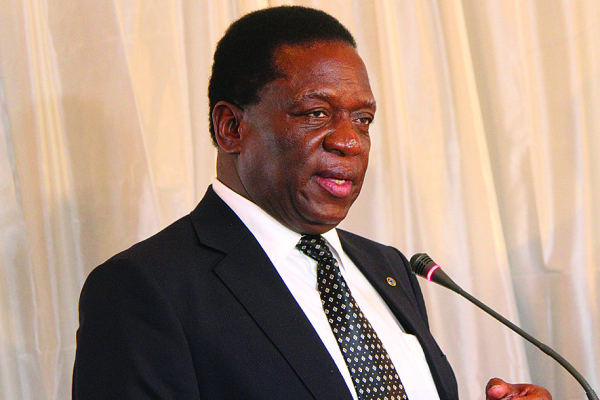
BY BLESSED MHLANGA/FARAI MATIASHE
THE European Union (EU) bloc’s top diplomats in Harare have rung alarm bells over the brutal crackdown on human rights activists and protesters by President Emmerson Mnangagwa’s administration in the past few days.
The police crackdown came after Zimbabweans, angry over the country’s worsening economic situation, recently took to the streets to register their displeasure on the pain caused by the regime’s economic austerity measures.
In a joint statement yesterday, the EU’s heads of mission, reminded Mnangagwa to stick to a wide range of reforms he promised soon after assuming power if his efforts to re-engage with the West were to bear fruit.
The statement was jointly issued by heads of mission for France, Germany, Greece, the Netherlands, Romania, Sweden, United Kingdom, Australia, Canada and the United States where the diplomats expressed concern over what they termed gross human rights violations prior to, during and after MDC’s organised demonstrations in Harare, Bulawayo and Gweru.
Police on Friday descended heavily on opposition activists gathered in Harare as part of the MDC’s series of protests against the fast-deteriorating economic situation in the country as a result of government’s harsh austerity measures. Law enforcement agents went on to crush similar protests in Bulawayo and Gweru on Monday and yesterday, respectively.
The police’s heavy-handedness on protesters and human rights activists came at a time Mnangagwa’s government is on a global charm offensive to re-engage the Western world, particularly the EU and have sanctions imposed on Zimbabwe lifted.
The sanctions were ironically imposed following gross human rights violations committed during former President Robert Mugabe’s era.
- Chamisa under fire over US$120K donation
- Mavhunga puts DeMbare into Chibuku quarterfinals
- Pension funds bet on Cabora Bassa oilfields
- Councils defy govt fire tender directive
Keep Reading
But Mnangagwa, who came into office in a November 2017 coup, appeared to have won the West’s sympathy after he promised a wide range of reforms to undo the damage caused by his predecessor’s toxic politics.
However, the latest developments are likely to force the bloc, which provides the bulk of the country’s humanitarian assistance, to further harden its stance against Harare.
“Intimidation, harassment and physical attacks on human rights defenders, trade union and civil society representatives and opposition politicians – prior to, during and following the demonstration in Harare on August 16 – are cause for great concern,” EU member countries said.
“Only by addressing concretely and rapidly these human rights violations will the Government of Zimbabwe give credibility to its commitment to address long-standing governance challenges. The heads of mission reiterate their calls for the implementation of the government’s political and economic reform agenda, underpinned by inclusive national dialogue and increased efforts to address the severe social situation.”
Civil society, opposition and trade union leaders last week raised the red flag following a series of abductions, torture and death threats by suspected State security agents, who accused them of organising the anti-government protests.
Tatenda Mombeyarara and the MDC youth leader Blessing Kanotunga, among others were allegedly abducted and tortured ahead of the MDC’s “Free Zimbabwe march” which was blocked by the police last week.
The EU and the United States, now accused by the government of sponsoring the demonstrations, said the acts by State security agents were a clear violation of the national Constitution.
“The Zimbabwean Constitution guarantees the right to personal security from violence and prohibits physical or psychological torture. The heads of mission urge the authorities to respect these fundamental rights, and to hold perpetrators of violence legally responsible,” the statement read.
But Information ministry secretary Ndavaningi Mangwana yesterday said the EU statement undermined civilian authorities and was promoting anarchy in the country.
“The government is taken aback by the intrusive and judgmental tone of the statement. The statement fails to acknowledge that the Zimbabwean High Court spoke on the issue, which rendered any action taken contrary to that judgment illegal. We, therefore, note with concern that the statement appears to support law-breaking in Zimbabwe, a position that appears to promote lawlessness in our peaceful country,” Mangwana said in a statement.
“To advocate for the disregard of court decisions and security assessments of the police is to undermine the civilian authorities as well as to promote anarchy in the country.”
The statement by the EU came at a time the Sadc region has rallied behind Mnangagwa, vowing to help him lobby for the lifting of Western-sponsored sanctions against the country.
Mnangagwa last week took over the rotational chairmanship of the Organ on Politics, Defence and Security, a move that has infuriated opposition MDC leaders who believe he is not a suitable candidate given the state of affairs in his backyard.
In a statement, the MDC called on African leaders to introspect and censure Mnangagwa instead of glorifying him.
“The MDC is perturbed by the statement on Zimbabwe in the 36-paragraph Sadc communique issued Sunday following the regional body’s 39th summit of Heads of State and Government that ran from 17 to 18 August 2019 in Dar es Salaam, Tanzania. The Sadc communique is gravely concerning, not just about what it said, but also about what it did not say about Zimbabwe. On paragraph 14 of their communique, Sadc leaders report that ‘Summit noted the adverse impact on the economy of Zimbabwe and expressed solidarity with Zimbabwe and called for the immediate lifting of the sanctions to facilitate socio-economic recovery in the country’.
“While Sadc leaders are well within their rights to pronounce themselves on the sanctions issue, it is disappointing that they have a frozen and opportunistic narrative on the matter. There’s no difference between what they have been saying since 2001 and what they said yesterday, like a vinyl record stuck in a groove,” the MDC said.












